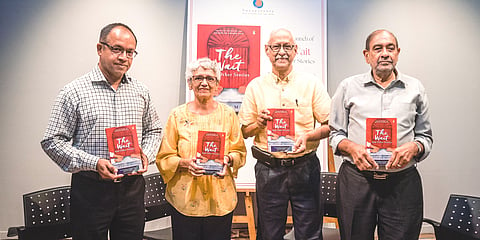

The release of Jnanpith awardee, Damodar Mauzo’s latest book, The Wait And Other Stories was held last week at Sunaparanta Goa Centre for the Arts, Altinho, Panjim. This book is the English translation of the book in Konkani titled, Dishtavani, by Xavier Cota. It is a compilation of 14 short stories, four of which are not part of the original book, but the other short stories by Mauzo.
The formal release of the book was followed by a conversation between Damodar Mauzo and writer, editor, translator José Lourenço, Xavier Cota, and author and playwright Isabel Santa Rita Vás, who also moderated this conversation.
During this conversation, Mauzo spoke about winning the Jnanpith award, which he didn’t expect, his writing process, and also how very rarely two stories simultaneously come to his mind. He said it happened to him, while writing his award-winning novel, Karmelin.
“When I was writing Karmelin, I had two stories in my mind, and both had a similar background of the Middle East. So, when I was writing it, the other story tried to get in and both stories became one. So, if you see the format, it is not that of a novel, and it reads like a short story. Even the ending is like that of a work of short-fiction. The publisher of it actually wanted me to change the ending, but I said no. Karmelin has brought me till here, and I love my ending and I will not change it. Also, one thing about me is that I don’t re-write my stories,” said Mauzo, also adding that sometimes, if he is not happy with any story, he just leaves it there and doesn’t go back to it.
A TRANSLATOR’S JOURNEY
Xavier Cota, while speaking about his journey of translation informed that, initially, he had issues with it as he had to learn and teach himself Devnagri Konkani in order to translate Mauzo’s stories. “It was painful, but also enlightening. The Konkani language is so rich, you get astonished by it. Also, he (Mauzo) hand held me initially, after that, I just enjoyed his stories,” said Cota.
He further commented that in his translation, he doesn’t give a glossary, but likes to play around with the word, so the reader gets the meaning of it, eventually.
Regarding the book, The Wait, he said that unlike most of his works, these stories are set not only in Goa, but have a wide range, and they are easy to read.
These short-stories include a cab driver, who assumes the identity of whoever his clients want him to be, and finds himself in a tricky situation with a passenger. A late night call leads a doctor down the path of lust and desire, but with unexpected results. A writer acquaints himself with a thief, who had broken into his house. A migrant worker falls in love, but wonders how he can present himself as a suitor. A young man, having lost the love of his life, takes it upon himself to resolve another couple’s dilemmas.
Mauzo’s sometimes bizarre, sometimes tender stories, set largely in Goa, probe the deepest corners of the human psyche with tongue-in-cheek humour, revealing the many threads that connect us to others and the ease with which they can be broken.
This event was held in collaboration with Penguin Random House India.